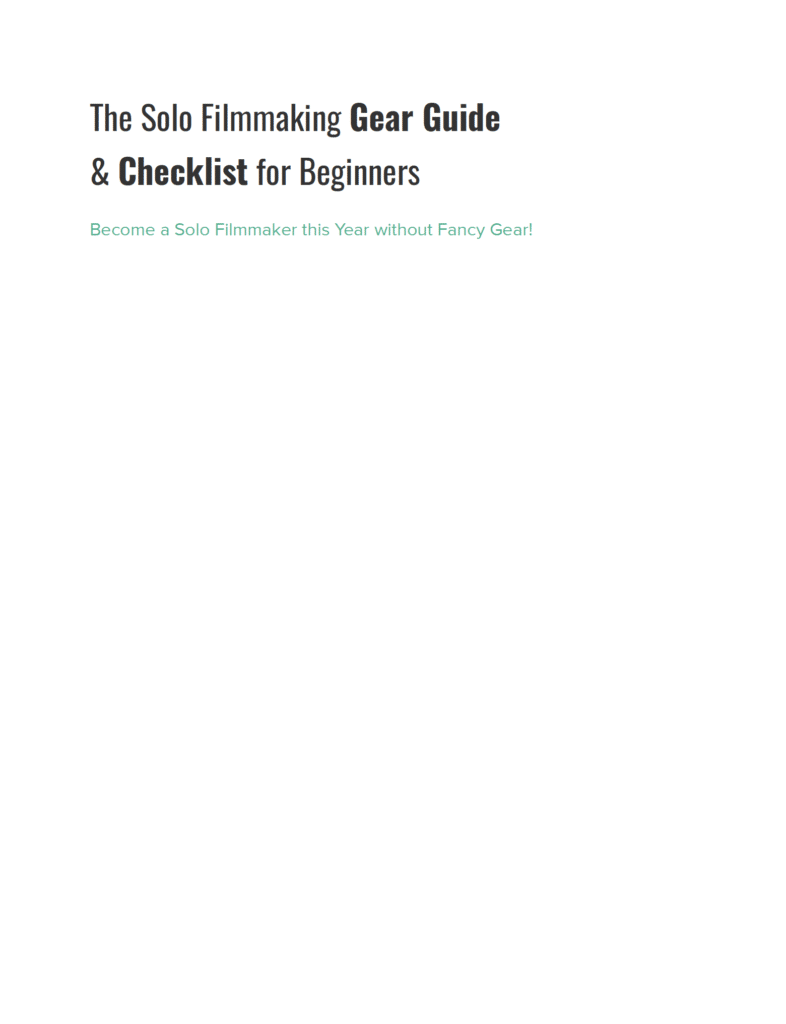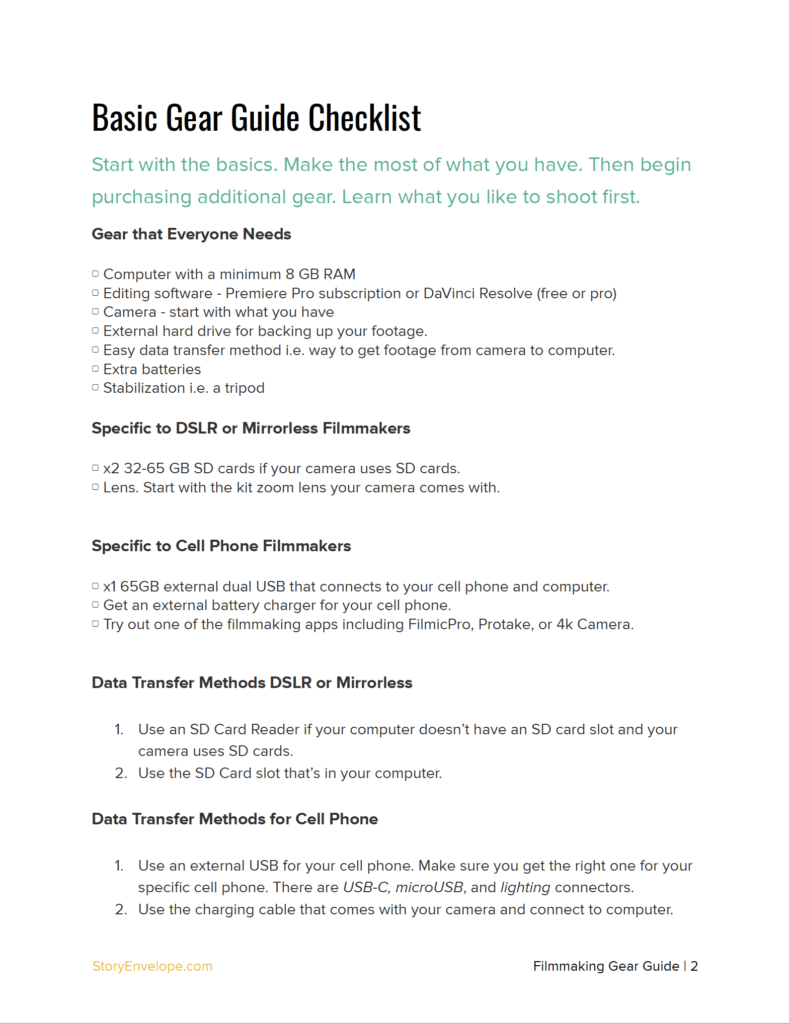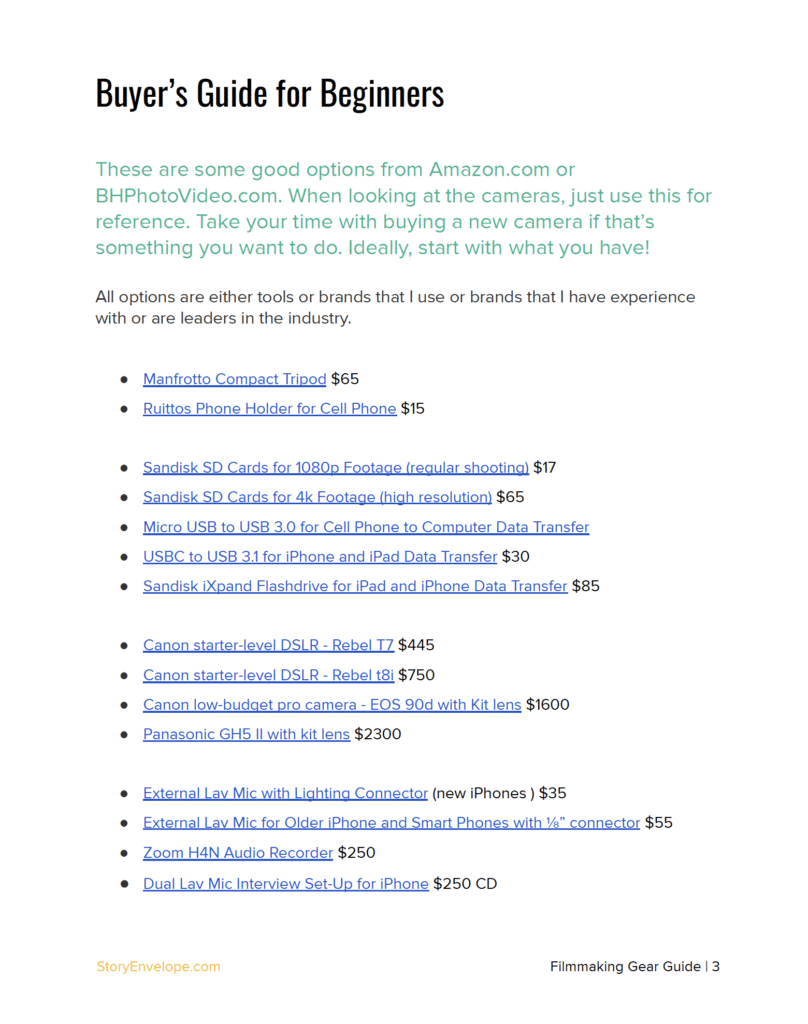Article and Video by Colette Nichol, Solo Filmmaker and Story Strategist
Estimated reading time: 8 minutes
In this video, I’m going to share with you the most essential filmmaking equipment for beginners. After watching the video, scroll down to learn more.
CLICK HERE to Subscribe to the Channel for more videos on Filmmaking, Creativity, Storytelling, and Tips on how to make your most important creative dreams and goals a reality.
I’ve been a solo filmmaker since 2014. In that time, I’ve also been running my own business and teaching others how to make films.
Over and over I’ve seen that an obsession with gear is what stops people from getting started. It also stops many aspiring filmmakers from focusing on technique. So while getting the right tools is important, it’s even more critical to focus on acquiring filmmaking skills.
Now, if you’re just getting started, watch the video above to find out the MOST important filmmaking equipment you need.
Spoiler alert: it’s not as complex as you might think. In fact, you don’t actually need that much gear to get started. And you’ll probably be surprised about what the most important piece of filmmaking gear actually is. No, it’s not your camera.
Get started by watching the video to find out what tools you need to get started making films.
Then review the rest of this post for some bonus tips.
What Filmmaking Equipment is Needed for a Film?
Making a film can be broken down into 5 main phases:
- Development
- Pre-Production
- Production
- Post-Production
- Marketing & Distribution
Within these five phases of the filmmaking process, you’ll need different filmmaking equipment.
We’re going to focus on Production and Post-production for now. But remember that there are other tools that will help you out in pre-production that can be useful.
Also, remember that there are literally millions of different options for you when it comes to filmmaking equipment, so this is going to be general. For every skill specialty, there are thousands of things that someone might choose to use. That said, it doesn’t have to be complicated if you don’t allow it to be.
Here are the basics that you’ll need if you want to START and FINISH a film of any length:
- Computer for editing
- Software for editing
- External hard drive for back ups (always have two copies of your film! at a minimum)
- Digital data transfer method i.e. a way to get your footage from camera to computer and external hard drives
- Camera (+ lenses, SD cards, batteries)
- Tripod and potentially other forms of stabilization
- Audio recording kit (this is a whole world of its own and there’s lots to say about this)
Filmmaking Equipment for Beginners
Again the filmmaking equipment you’ll need as a beginner fits within the same guidelines as the equipment someone will need to make an indie film. The difference is that you don’t use a $30,000 camera to start practicing. You shouldn’t be using complex gear when you’re just starting out. In fact, you should start out using what you have and then go from there.
If you’re a beginner, here’s a good guide of where and how to start putting together your filmmaking gear:
1 COMPUTER & SOFTWARE
Set up your computer with filmmaking software. If you need to add RAM or additional storage or upgrade your hard drive to make editing easier, do that first. Start with Premiere Pro or DaVinci Resolve as your software unless you already have Final Cut. Don’t start with non-professional software as it’s limiting and frustrating to use.
As long as your computer has 8GB RAM and a decent hard drive, you should be good to get started with video editing. There are even workarounds for slow computers!
2 CAMERA
Use the camera that you already have. If you have a decent cell phone, use that camera. Then upgrade later to a DSLR, mirrorless or low-cost cinema camera.
3 LENSES
Be aware that one of the biggest things that determine the quality of your footage is your lens. You want the best lens for your camera. BUT you shouldn’t start investing a lot of money in lenses when you’re first starting out. Why not? First, you need to know what you like to shoot. Then you can correctly research and buy the right lenses. Before you have a filmmaking practice you should not spend big money on lenses.
4 EXTERNAL HARD DRIVE
Get an external hard drive and make backing up your footage part of your process. Always have two copies of all projects. It’s better to have three copies and to make sure you have a backup system in place. More about hard drives in the Filmmaking Gear Guide Checklist HERE.
5 EASY DATA TRANSFER METHOD
Make sure that getting your footage from camera to computer is easy. Don’t do this over Wifi!
6 BATTERIES
Always have more batteries than you think you need. If you’re using a cell phone then get a back up battery (and external battery charger) for your cell phone. For DSLRs etc then have at least 3 batteries for your camera if you’re doing long shoots. For regular shooting 2 batteries is ok.
7 STABILIZATION I.E. TRIPOD
THE MOST IMPORTANT PIECE OF GEAR IS YOUR TRIPOD! Okay, I know that was yelling. But it’s true! Yes, your computer is the most essential piece of gear. But then comes your stabilization. In most cases starting with a tripod is the right choice. On Hollywood films they’re using tripods that cost as much as the camera i.e. $30,000 or more. That’s how important a tripod is. It keeps your footage stable and allows you to master framing.
8 AUDIO RECORDING KIT
When you’re starting out this is going to include a way to record audio and a way to ensure that you can get the microphone close to your subject. The most important rule of capturing clean sound is getting the mic close enough to your subject or talent that you have a good signal-to-noise ratio i.e. more of the sound you want and less of the sound that you don’t want.
When first starting, you can just use a 2nd cell phone to record audio. Get it close by taping it to a chair or something else. Then later you can expand to a more pro setup. This might include a shotgun microphone, a mic stand, and an external recording device. If you want to learn more about sound and get a free sound gear buyer’s guide then CLICK HERE for more >
Filmmaking Equipment List PDF
Want a PDF that’ll guide you through the filmmaking gear that you need to get started? Grab it below! This super simple guide will save you a ton of time and money.
CLICK HERE to get the free filmmaking checklist and guide.
Common Filmmaking Gear Questions
Do you need a camera slider when starting out?
Nope! A slider is rarely used in filmmaking. What does it do? It allows you to have your camera move (or almost glide) in a nice clean slow pan across a scene. It might be necessary if you’re doing very specific work like high-end real estate films. But watch any movie and see how often the camera slowly pans across a scene. Then ask yourself how necessary that pan even was to the meaning of the film.
So no, you don’t NEED a slider. If you want to try one out for a project, just rent one. Then decide if you’re going to use it enough to warrant the purchase.
Do you need a DJI drone when starting out?
No again. BUT if you’re insanely excited about the idea of getting drone footage, well feel free to buy one. Just know that you can’t make an entire film with drone footage, so be careful with your budget. If you bust the budget on your drone and the rest of your footage is basic compared to that drone footage then you’ve got a problem. Also, if your computer is ancient but you’re buying a drone first, perhaps not a good choice.
That said, I know of one aspiring filmmaker whose entire life got turned around when his brother gave him a drone. He basically found his purpose. There was something about creating this footage from the sky that really ignited his creativity. So follow this rule: buy what excites you! If you’re super excited about getting drone footage, I’m not going to stop you. 🙂
Rent Filmmaking Equipment Instead of Buying When Making Your Indie Film or Short
If you’re reading this because you want to make an indie feature or a festival short film, then you don’t need to buy anything! In fact your crew will either own the gear already or you can rent. Usually, you’ll need to rent lights and stands and maybe some other grip equipment. But every film you’ll make will be different and will have different needs. Put together your crew first and then create a gear list with them that fills in the gaps that they don’t already have.
Learn Filmmaking and Get the Gear Guide
If you’re interested in learning filmmaking, check out the Solo Filmmaking Mentorship Program I created for aspiring filmmakers and video creators. It usually goes live once per year. So I recommend getting the Story Envelope Filmmaking letter which comes out a couple of times per month. That way, you can get filmmaking tips for free and find out when the filmmaking course is going live again.
Also, before you go, grab the Solo Filmmaking Gear Guide and Checklist for Beginners.

About the Author
Hi! I’m Colette Nichol. I’m a solo filmmaker and story strategist based out of rainy Vancouver, Canada. I’ve been making videos and micro films for small businesses and global brands since 2014.
Plus, I LOVE to help aspiring filmmakers pursue their dreams and start making films. This blog is designed to help you gain the knowledge you need to become a filmmaker.
If you want more, get on the waitlist for the Story Envelope Academy Solo Filmmaking Mentorship Program. It opens up one time per year and is the best way to become a filmmaking or video pro fast!
CLICK HERE to get on the solo filmmaking mentorship waitlist.


